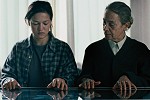 Shadows off the beaten path
Shadows off the beaten path< < F O R E I G N > >
last update 1.Sep.07
See also: SHADOWS FILM FESTIVAL
 R E V I E W B Y R I C H C L I N E
R E V I E W B Y R I C H C L I N E Vier Minuten
Vier Minuten
 Beautifully shot and teasingly edited, this subtle-but-charged drama circles around two women in a tricky situation who form an unlikely alliance. The strong performances and a gradually deepening story keep us utterly gripped.
Beautifully shot and teasingly edited, this subtle-but-charged drama circles around two women in a tricky situation who form an unlikely alliance. The strong performances and a gradually deepening story keep us utterly gripped.
Traude Kruger (Bliebtreu) has been teaching piano to prison inmates since the war ended, but she knows her career is nearing an end. Partly to prove herself to her superiors, and also because she's intrigued by the challenge, she takes on the most notorious, unstable inmate, Jenny (Herzsprung), whose raw talent is masked by violent bravado. Both women have brutal pasts that have shaped them and scarred them, which only makes Traude more determined to get Jenny into an upcoming piano competition, where Jenny will have four minutes to redeem herself. If the guards don't arrest her first.
The clash between these two women is fascinating, mainly because they are such polar extremes and yet also rather similar. And the actors inhabit these characters fully, as Bliebtreu's cold tenacity ricochets off of Herzsprung's fiery temper. They stand up to the guards (Pippig and Muller) and the slippery warden (Kurt) in very different ways, creating a strangely united front that simmers (and sometimes explodes) with intensity. They also bring out the script's comical touches with razor sharp timing, releasing the pressure mercifully before plunging into the next gruelling standoff or harrowing revelation.
Writer-director Kraus holds this together tightly, revealing secrets in flickering flashbacks and fertile dialog as both women prove to be far more than anyone expected. He also uses the music brilliantly, from the opening shots accompanied by power metal (Traude quickly changes the radio station) to the astonishing climactic competition. Music is what holds both of these women together, and it gives the film its backbone as Traude and Jenny clash over "that negro music" even as they begin to find a powerful mutual respect.
Yes, it's all a bit tidy and over-constructed--both literary and theatrical. And the details of their pasts are somewhat heavy handed. But the personal connection between them is cleverly understated, leading to surprising plot turns and a remarkably effective final sequence in which those four minutes become the only thing in the world.
with Monica Bleibtreu, Hannah Herzsprung, Sven Pippig, Richy Müller, Jasmin Tabatabai, Stefan Kurt, Vadim Glowna, Nadja Uhl, Peter Davor, Edit Malovcic, Kathrin Kestler, Christian Koerner
 release Ger 1.Feb.07,
release Ger 1.Feb.07, UK 7.Mar.08
06/Germany 1h52
TORONTO FILM FEST
BERLIN FILM FEST
31.Aug.07
 R E V I E W B Y R I C H C L I N E
R E V I E W B Y R I C H C L I N E
 Clearly wanting to take a break after his acclaimed vengeance trilogy, filmmaker Park offers us a quirky, surreal love story set in a wacky mental hospital. So utterly unhinged that it's not easy to engage with, it's still strangely charming.
Clearly wanting to take a break after his acclaimed vengeance trilogy, filmmaker Park offers us a quirky, surreal love story set in a wacky mental hospital. So utterly unhinged that it's not easy to engage with, it's still strangely charming.
Young-goon (Lim) is a sparky young woman who starts believing she's a robot, so naturally she plugs herself into the power grid. This is perceived as a suicide attempt, and she's sent to an asylum, where she meets the shy Il-soon (Jang). Quietly smitten, Il-soon sets out to help Young-goon in any way possible, believing he can steal personality traits from other patients. The big problem is that Young-goon believes that food will harm her, and her batteries-only diet leaves her wasting away. So time is running out for Il-soon to save her.
Even with a witty, light-hearted romance, Park can't resist adding dark edges, including a growing sense of violence as Young-goon imagines turning her recharged weapons on the "white ones" who imprison her. Her doctor (Choi) has no idea what's happening in her mind, including issues going back to her grandmother (Sohn), who believed she was a mouse. The entire cast plays it with a kind of wide-eyed wonder, strangely grounding the absurdity in a submerged authenticity.
On the surface, the film is a hilarious bundle of colourful characters and personality tics, as the whizzy camerawork reveals tiny details in every scene. The crazy behaviour of the inmates offers an almost overwhelming number of running gags, including Young-goon's hilariously food-obsessed roommate (Park), a patient (Lee Young-mi) who constantly weaves colourful stories, a painfully paranoid boy (Kim Choon-gi) and a girl (Joo) who yodels while dressed as a Swiss maid.
Intriguingly, Park isn't poking fun at all; there's a strange dignity to each person and their communal social system. But the jarring mix of comedy, violence, romance and sadness makes it impossible for us to fully sympathise with any of the characters. Still, the film is consistently, enjoyably outrageous and finds a surprising sweetness in Il-soon's quest to save Young-goon. And a kind of deranged genius in Park's take on the seven deadly sins.
scr Chung Seo-Kyung, Park Chan-wook
with Lim Soo-jung, Jang Ji-hoon, Choi Hee-jin, Lee Young-mi, Park Jun-myun, Kim Choon-gi, Joo Hee, Sohn Young-soon, Lee Yong-nyeo, Oh Dahl-su, Chun Sung-hoom, Kim Byung-ok
 release Kor 7.Dec.06,
release Kor 7.Dec.06, UK 4.Apr.08
06/Korea 1h45
BERLIN FILM FEST

17.Aug.07 eiff
 R E V I E W B Y R I C H C L I N E
R E V I E W B Y R I C H C L I N E aka: L’Héritage
aka: L’Héritage
 Father and son Georgian filmmakers take an intriguing look at the collision between new and old, east and west in their home country. The film is colourful and almost shockingly vivid, with a refreshingly foreign feel that's thoroughly accessible.
Father and son Georgian filmmakers take an intriguing look at the collision between new and old, east and west in their home country. The film is colourful and almost shockingly vivid, with a refreshingly foreign feel that's thoroughly accessible.
Three young French people (Testud, Merhar and Olga Legrand) are in Tbilisi to look at a ruined castle they've inherited. They hire fast-thinking translator Nikolai (Bongard) to accompany them on the two-day bus journey, but along the way they meet a young man (Babluani) accompanying his grandfather (Gaparidze) to a village where he will be killed to settle a family feud. Both horrified and fascinated, they go along to watch, helped by a mute (Augustin Legrand) who lives in the same village. But the reality is both too much for them and too unpredictable.
The filmmakers intriguingly avoid making a travelogue of their country, rather focussing their camera on the intimate details of their characters and the culture. Offbeat interactions, telling glances and incomprehensible behaviour greet them at every turn in a rural countryside where people seem to live on cigarettes and vodka. There's also an incredible sense of dark comedy at work here, from the opening scene when they have their video camera stolen to the back-alley shop where they buy it back. Everyone here is a mercenary, but they are also fiercely protective of their society.
As the story progresses, the gulf between the locals and the foreigners widens rather than narrows. The entire cast of actors all give terrifically natural performances. The film often feels almost documentary-like, and at other times it's closer to 1960s neo-realism. The confrontation on the bridge in the small village is more like a Wild West showdown, with its little rituals and ironic twists.
This is a scruffy, fascinating little film that looks at what some might call extremely skewed morality based on vengeance. But the apparently lawless Georgians clearly feel the same way about the brazen foreigners who are obsessed with a completely alien brand of justice. That the film gently asserts the truth about who is right in this situation is its small, but important, triumph.
scr Temur Babluani, Géla Babluani, Jacques Dubuisson
with Sylvie Testud, Stanislas Merhar, Olga Legrand, Pascal Bongard, Augustin Legrand, Giorgi Babluani, Leo Gaparidze, Beka Sikharulidze, Givi Sikharulidze, Levan Uchaneishvili
 release US Jan.07 sff,
release US Jan.07 sff, UK Aug.07 eiff
06/Georgia 1h17
SUNDANCE FILM FEST

17.Aug.07 eiff
 R E V I E W B Y R I C H C L I N E
R E V I E W B Y R I C H C L I N E
 With a quietly insinuating filmmaking style, Argentine writer-director Puenzo invests this tricky story with real soul, bringing the characters and their situation to vivid life.
With a quietly insinuating filmmaking style, Argentine writer-director Puenzo invests this tricky story with real soul, bringing the characters and their situation to vivid life.
Alex (Efron) is a 15-year-old living at the seaside, where her father (Darín) works as a marine biologist and her mother (Bertuccelli) takes care of the home. They ask a friend who's a plastic surgeon (Palacios) to come visit, bringing his wife (Pelleritti) and their son Alvaro (Piroyansky), who's Alex's age. The plan is to discuss what to do about Alex, who was born with both male and female genitalia. And this is something the naive Alvaro is on a collision course to discover himself.
Puenzo cleverly understates this central issue, letting us move through the story along with Alvaro, a wide-eyed teen very nicely played by Piroyansky. We can understand his fascination with the enigmatic, feisty Alex (another superb performance), who's bigger and tougher than the boys in town and is a victim of horrible prejudice from everyone outside the family. While the teens try to connect with each other and completely miss the point, both sets of parents are simply incapable of truly understanding their kids.
Essentially these people are all on their own, struggling in individualistic ways to understand Alex's situation and find a path forward. But nothing about it is easy. Does she undergo yet another operation followed by more and more drugs? Do they have to move somewhere even more isolated? Or can they find a way for her to be who she is? The film has at its heart an aching yearning not for "normalcy", but for acceptance.
This is what makes the film so deeply important, mainly because Puenzo never preaches at us; she reveals the story gradually, knowing there's only one conclusion any fair-minded person can possibly reach. And she assembles the film with lyrical camera work and an earthy group of actors who let us see and feel their emotional responses to each other. The story is punctuated by scenes of raw power that are short and very sharp, offering us startling insight and jarring us out of any simple-minded solutions we might be considering. This is bold, unflinching filmmaking that provokes a response.
with Inés Efron, Martín Piroyansky, Ricardo Darín, Valeria Bertuccelli, Carolina Pelleritti, Germán Palacios, Luciano Nóbile, Lucas Escariz
 release Arg 14.Jun.07,
release Arg 14.Jun.07, UK 9.May.08
07/Argentina 1h26
CANNES FILM FEST

18.Aug.07 eiff


See also: SHADOWS FILM FESTIVAL | SHORT FILMS
© 2007 by Rich Cline, Shadows
on the Wall